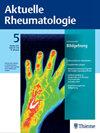Adherence to Colchicine During Pregnancy in Familial Mediterranean Fever Patients: Reasons for Cessation and Outcomes from a Single-Centre Experience
IF 0.2
4区 医学
Q4 RHEUMATOLOGY
引用次数: 0
Abstract
Abstract Objective To evaluate the adherence to colchicine treatment during pregnancy and lactation in our Familial Mediterranean fever (FMF) patients and investigate the reasons for non-adherence and consequences. Methods Adult female FMF patients who were followed up in our rheumatology clinic and had a history of pregnancy after the diagnosis of FMF were consecutively enrolled to this cross-sectional study between November 2021 and June 2022. Only pregnancies occurring after the diagnosis of FMF were evaluated. Patients who did not stop using FMF treatment after pregnancy were considered to adhere to treatment. Results In 50 patients, a total of 88 pregnancies and 58 live births were observed after the diagnosis of FMF. 37 (74%) had at least one completed pregnancy, and 13 (26.0) were pregnant during the study. Among the 37 patients, 34 had at least one live birth. No significant differences were observed when rates of patients with a history of at least one live birth, abortus, Cesarean section (C/S), preterm labor, stillbirth, intrauterine anomaly, congenital malformation and fetal growth retardation were compared between colchicine users and non-users. 60% of the patients adhered to colchicine treatment during pregnancy and 73.4% did so while breastfeeding. The most common reason for colchicine cessation was concerns regarding potential harm to the fetus (70%), followed by the presumption that colchicine is contraindicated in pregnancy (15%) as well as absence of FMF attacks (10%). The most common source of the patients’ opinion was a physician (60%). Conclusions Both patients and attending physicians should be informed to be more adherent to colchicine to avoid adverse outcomes and FMF-related complications.家族性地中海热患者妊娠期对秋水仙碱的依从性:停止使用的原因和单中心经验的结果
目的评价家族性地中海热(FMF)患者妊娠和哺乳期秋水仙碱治疗的依从性,探讨不依从性的原因和后果。方法在2021年11月至2022年6月期间,在我们的风湿病诊所随访并诊断为FMF后有妊娠史的成年女性FMF患者连续入选本横断面研究。仅评估FMF诊断后发生的妊娠。妊娠后未停止使用FMF治疗的患者被认为坚持治疗。结果50例患者诊断为FMF后,共观察到88例妊娠和58例活产。37人(74%)至少有一次完成妊娠,13人(26.0%)在研究期间怀孕。在37例患者中,34例至少有一次活产。秋水仙碱服用者和非服用者的活产史、流产史、剖宫产史、早产史、死产史、宫内异常史、先天性畸形史和胎儿生长迟缓史的发生率比较无显著差异。60%的患者在怀孕期间坚持使用秋水仙碱,73.4%的患者在母乳喂养期间坚持使用秋水仙碱。停用秋水仙碱最常见的原因是担心对胎儿的潜在危害(70%),其次是秋水仙碱在妊娠期禁忌症(15%)以及没有FMF发作(10%)。患者意见最常见的来源是医生(60%)。结论应告知患者和主治医生秋水仙碱的使用应更加坚持,以避免不良后果和fmf相关并发症。
本文章由计算机程序翻译,如有差异,请以英文原文为准。
求助全文
约1分钟内获得全文
求助全文
来源期刊

Aktuelle Rheumatologie
医学-风湿病学
CiteScore
0.30
自引率
0.00%
发文量
135
审稿时长
>12 weeks
期刊介绍:
Immer auf dem Laufenden: - Kontinuierliche Fort- und Weiterbildung - Themenhefte mit Übersichtsarbeiten - Originalarbeiten zum Stand der Forschung - Informationen über neueste Entwicklungen Für Sie notiert - Nachrichten aus dem Fachgebiet - Aktuelle Literatur kurz referiert Das ganze Spektrum rheumatischer Erkrankungen aus internistischer und orthopädischer Sicht: - Interdisziplinär - Kompetent - Praxisnah
 求助内容:
求助内容: 应助结果提醒方式:
应助结果提醒方式:


